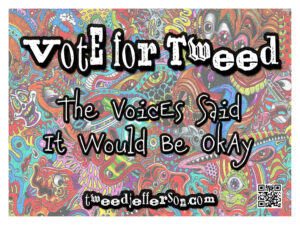Who is Tweed?
01
Biography
The Brief-but-Relevant History of Tweed
or How I Learned to Stop Worrying and Love the Noise
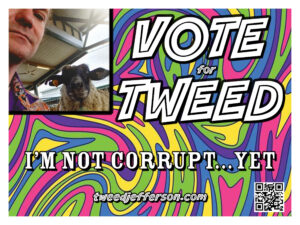
It All Started With a Couples' Skate
or Where Responsibility Met Jean Jackets
I began my illustrious “career” at the age of fourteen, working at a roller rink. Yes, a roller rink. A place where disco balls spin endlessly, fluorescent lights flicker like they’re auditioning for a horror film, and the smell of shoe sanitizing spray becomes a permanent olfactory tattoo. My responsibilities? Monitor teenagers in a sugar-fueled frenzy, prevent catastrophic collisions between toddlers and rollerblading daredevils, and occasionally unstick skates from a toddler without losing a finger.
By sixteen, I’d somehow leveled up to assistant manager at Taco Bell. If roller rinks taught me patience, Taco Bell taught me crisis management at the nuclear level. Picture this, a lunch rush where everyone has a different definition of “extra cheese,” cash registers with a vendetta against human logic, and teenaged employees with more attitude than sense. Somehow, I survived. Not only did I survive, but I thrived, discovering early on that there’s a stark difference between management and leadership. It also taught me skills no MBA can provide: conflict resolution between cashiers with guacamole guns, emergency fryer repairs, and the rare but vital ability to interpret teenage slang.
Big-Box Retail
or The Art of Herding Humans
After mastering fast food chaos, I moved on to the retail sector, managing several big-box stores. A land of fluorescent lights, endless shelves of discounted whatever, and employees whose primary skill is vanishing exactly when you need them. This is where I refined my delegation, my leadership philosophy, and my ability to smile while silently questioning the meaning of existence.
I discovered that leadership isn’t about barking orders; it’s about making people want to follow you, even when you’re assigning them to organize fifty pallets of dog food. I became fluent in the delicate art of motivating people without resorting to angry tirades, although there were days when it was tempting. Between inventory crises, lost shopping carts, and the occasional fistfight over discounted wedding invitations, I learned that humans are simultaneously unpredictable, inspiring, and slightly terrifying.
Retail management also provided me with a highly underrated skill: problem-solving in status-quo situations. From reorganizing entire departments overnight due to a sudden change in vendors, to calming irate customers with the skill of a seasoned diplomat, I became an expert in turning chaos into temporary harmony. I also became familiar with the curious psychological phenomenon known as “storewide panic,” which occurs every time someone holds up the line by writing a check (or that time I accidentally hit the fire sprinkler with the forklift).
The Road to Glory
or Business as Usual
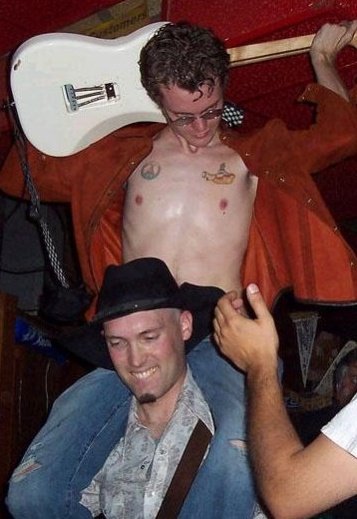
In my mid-20s, I decided to take a detour from the glamorous world of management and enter the life of a full-time musician. I started from the bottom. From the basement, actually. The dank, echoey basement of a friend’s house that smelled like a combination of clove cigarettes, old pizza, and ambition. From there, I graduated to a spare room in a church and, eventually, owning my own studio, collaborating with award-winning artists and leading bands that, astonishingly, still exist today.
But being a musician doesn’t mean abandoning responsibility. I transformed my management experience into a remote consulting business (back in 2004, which was a novel concept at the time). Using pre-wifi data hookups and a lot of optimism, I helped small businesses modernize, streamline, and, in one infamous case, increase revenue by 1,800% in sixteen months. In a few years, that company’s entire industry had changed nationwide to adopt the standards and protocols that I’d designed. That’s right, I basically altered a micro-economy from a hotel room between gigs, all while wearing an Angelflight suit that I found at a thrift store.
This period taught me something crucial: the world responds to creativity and bold ideas, but it also appreciates someone who can deliver those ideas without causing a full-scale mutiny. I became an expert in “management by proxy,” guiding businesses from afar while simultaneously perfecting guitar solos, writing songs, and occasionally arguing with myself about the correct mixing level for a snare drum.
Skills, Certifications, and the Obsessive Pursuit of Mastery
or The Unexpected Virtue of Ignorance
Some people collect comic books. Others collect houseplants that mysteriously die within three weeks. Me? I collect hobbies. I like to think of it as preparing for the apocalypse, except instead of stockpiling canned beans, I stockpile information. Over the years, I’ve amassed a veritable smorgasbord of abilities ranging from carpentry to cooking, gardening to graphic design, websites to audio/video production, martial arts, and even a “mastery” of roughly forty musical instruments. Don’t ask me to list them all.
Certifications? I’ve got a few of those too, some practical, some just because they looked fun. A home inspection certification, for example, which I have absolutely no intention of doing professionally but now know that your plumbing has opinions about your life choices. Black belts in multiple martial arts? Check. Not because I plan to fight anyone, but because discipline, persistence, and the philosophy of Aiki are surprisingly applicable to real life.
I’ve found that mastering a skill, any skill, is as much about patience as it is about sticktuitiveness. I can patiently assemble a pile of wood into something resembling furniture, and I can stubbornly spend four hours trying to setup a double-neck guitar/mandolin that refuses to cooperate, all while muttering philosophical observations about the futility of existence. This has become my secret sauce for problem-solving. If everyone else says it’s impossible, I just assume they haven’t yet tried my particular brand of weird creativity.
Owning a studio, producing albums, leading bands, and directing rehearsals has taught me that leadership isn’t about shouting “do this!” It’s about coaxing the best out of others, whether that’s getting a trombonist to play his solo a little more ‘brown’ or convincing your guitarist that turning spreadsheets into an interpretive jazz piece is a reasonable endeavor (spoiler: I am the guitarist). These skills all feed back into my approach to life: everything can be improved, usually in ways that seem ridiculous until they work.
And if city council meetings ever involve carpentry, cooking, martial arts demonstrations, impromptu guitar solos, or heated debates about the aerodynamic properties of zucchinis, I am unquestionably prepared.
Volunteerism, Public Service, and Search-and-Rescue
or Still Herding Humans, but in the Wild
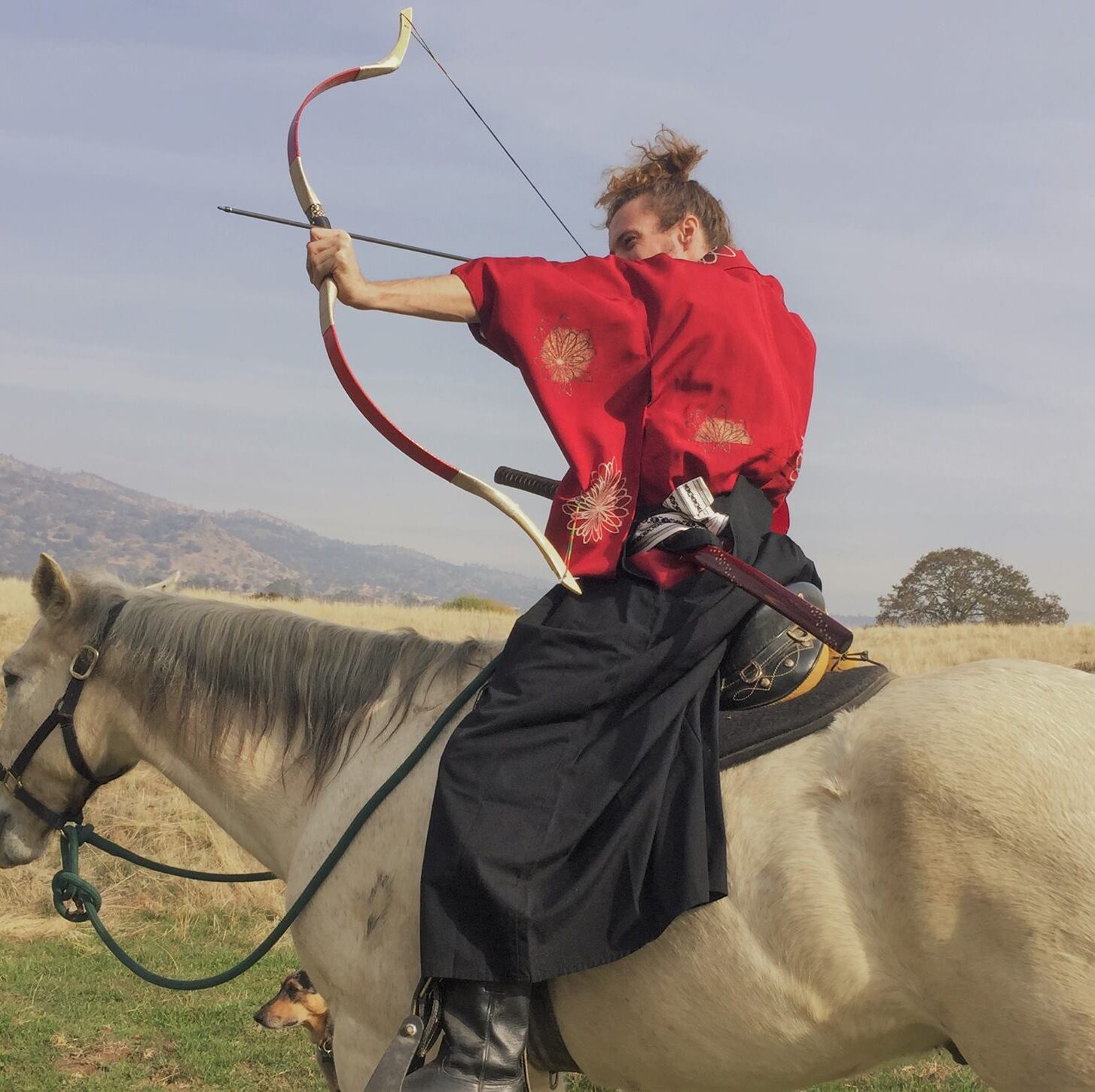
I don’t volunteer out of résumé desperation or a misguided need for sainthood. I do it because the world is a strange, fascinating place, and humans are at their best when they’re building something together – preferably not a doomsday device. Over the years, I’ve racked up more than 20,000 hours of volunteer work. That’s roughly enough time to binge an entire streaming library, teach every dog in a medium-sized city to sit, or compose a thousand cynical haikus about life’s relentless weirdness.
My first stint was with the sheriff’s department, as an explorer/cadet in my teen years. Then volunteering as support for special events. I participated in more adventurous endeavors, too. Like disaster relief and search-and-rescue. There’s nothing quite like trudging through forests, mountains, or national parks at odd hours, flashlight in hand (or on head), while arguing with a backpack strap that has clearly given up on life. On one occasion, I even found a man who had wandered off and become very good at being lost. It’s not as exciting as it sounds – he was like five-hundred feet from the trail, temporarily immobilized.
Many years later, I spent time training 911 dispatchers. This role taught me the subtle art of saying, “Yes, the world is literally falling apart, but please breathe into the headset like you’re in control.”. It turns out that human panic is both highly contagious and incredibly inconvenient, especially if you’re trying to teach someone to remain calm while simultaneously calming five screaming citizens on the other line.
Beyond emergency services and lost humans, I’ve spent countless hours organizing community outreach, such as teaching self-defense to children. Tiny humans who think martial arts class is primarily about testing your ability to dodge jump kicks and break up impromptu wrestling ‘matches’. Teaching them taught me patience, humility, and the terrifying realization that even black belts can be challenged by a particularly aggressive seven-year-old wielding a foam sword.
I’ve also organized large-scale events. Concerts, music festivals, and even a training conference for over fifty law enforcement agencies. Imagine trying to coordinate fifty agencies, each with their own chain of command, pride, and opinions on dress code, while simultaneously juggling logistical nightmares, rogue volunteers, and the universal law that “anything that can go wrong will do so in spectacular fashion.” Somehow, it all worked out. Mostly.
People are both exasperating and remarkable. They can panic over a minor scrape or perform extraordinary acts of courage. They may bicker over seats at a festival or help strangers in profound ways. Observing this has given me insights into systems, leadership, and the comic nature of civic life.
So, yes, I have spent decades building skills in crisis management, event coordination, and working with humans. Skills that, I assure you, translate to city council work. If nothing else, it’s prepared me for meetings where people yell at each other over very minor issues. At this point, I like to think of myself as a ninja with a soft heart and a lifelong commitment to helping people, fixing problems, and occasionally saving a lost dog (or ten) along the way.
Writing, Reading, and Helping Others Chase Their Dreams
or How to Turn Dreams Into Slightly Better Reality
I don’t just collect hobbies. I collect books, ideas, and the occasional existential crisis. For many years, I read roughly fifty books per year – mostly nonfiction, because reality is more bizarre than fiction if you pay attention – and occasionally dipping into fiction when I felt like seeing how the other half of humanity overcomplicates plots for fun. Or when it became “market research” for my own novels. Reading became my primary method of understanding the world, humans, and the art of pretending you know what you’re doing while secretly wondering if anyone else noticed the urine stain on your pants.
Eventually, I realized reading was not enough. I had words of my own to share, thoughts to refine, and, frankly, too much energy to sit still without turning my mental chaos into something tangible. Over the years, I’ve written a dozen books, covering everything from the adventures of dementia-laden old men, vigilante rockstars, and practical guides on emergency response and starting off in the music business. Some of them are even good, though I admit this is partly because I am skilled at editing out the parts that make me look slightly less like a competent author, despite what this bio may tell you.
Helping others has always been a core part of my artistic journey. I’ve volunteered my time and expertise to edit books, produce albums, and mentor aspiring musicians and writers, all at zero cost. Why? Because I understand the thrill of chasing a dream, the joy of creating something entirely from your own mind, and the crushing despair when someone tells you, “Yeah, it’s okay.” I wanted to offer a hand, a word of advice, or a parable that makes you laugh while also making your work better.
Producing albums in the studio was a particularly enlightening endeavor. Artists come in with visions, ideas, and egos the size of small planets. My role? Keep them on track, help them realize their potential, and occasionally provide a well-timed dose of reality when a guitar solo threatened to exceed both the laws of physics and good taste. Writing, editing, mentoring, these pursuits taught me communication and the curious fact that humans are capable of extraordinary creativity when properly encouraged (or occasionally forced, gently).
Literary and studio work also reinforced one of my core philosophies: details matter, but the message is omnipresent. Appreciating this duality – the micro and the macro – is central to both writing and civic engagement. I bring the same mindset to public service: notice the details, but understand the larger, often difficult issue. It’s about finding solutions where others only see problems, and sometimes laughing while you do it.
Ultimately, writing and mentoring others isn’t just about the end product. It’s about community, creativity, and helping people find their own voice in a world that often demands conformity. It’s about celebrating human ingenuity while acknowledging its delightful absurdity. And, yes, it’s about making sure that no one else ever suffers from the same devious publishers, confusing edits, or misplaced metaphors that I endured.
Educational Midlife Crisis
or Pretending I Understand College Life (Again)
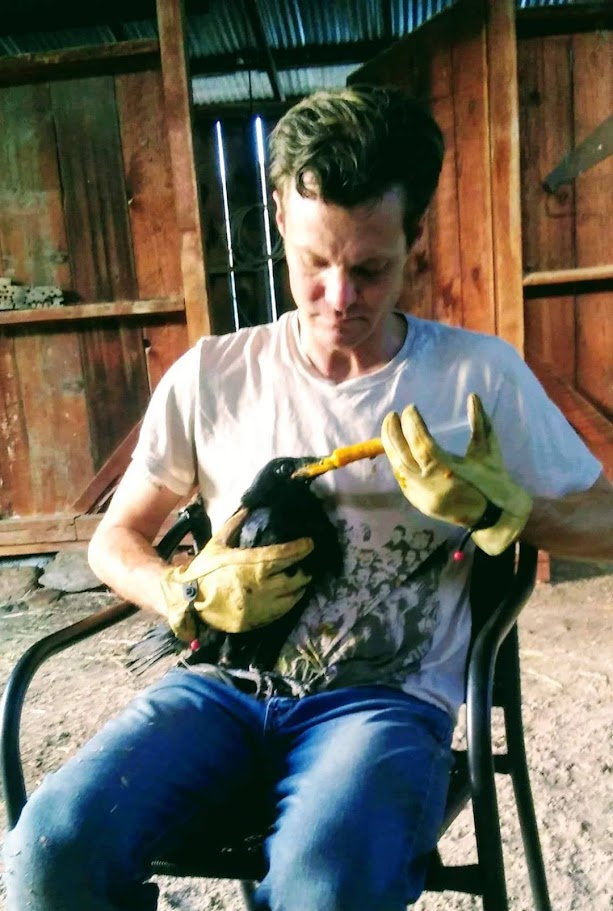
Just when you think life has settled into a predictable rhythm of chaos and occasional triumph, it turns out it has a peculiar sense of humor. At forty, I decided to go back to school. Yes, after one spectacularly short and forgettable half-semester at nineteen, I figured the universe owed me a second chance to test whether I could survive academia. It’s still challenging, but now I have more books, life experience, and a slightly better sense of what “syllabus compliance” actually means.
Returning to school wasn’t just about classes, it was about throwing myself into the full student experience like a slightly reckless academic gymnast. I took twenty units per semester and, somehow, I survived. I also became president of the writing club, which allowed me to encourage budding authors while secretly enjoying the thrill of correcting someone’s grammar in front of a group (all in good humor, of course). But why stop there? I founded and presided over a Wellness Club, because nothing says “midlife academic renaissance” like organizing yoga, critiquing what we eat, and occasionally awkward group discussions about stress management.
Beyond clubs, I found myself compiling and publishing a book of student writing and art, which was equal parts chaotic, inspiring, and terrifying. Organizing on-campus events, encouraging students, and navigating the occasional drama of group projects reminded me of every concert, festival, and training I’d ever coordinated. Working with these young adults allowed me to share my experiences, impart wisdom (sometimes accidentally), and help them thrive, all while secretly wondering if I remembered how to write a coherent research paper without using Wikipedia. Fast-forward to today, I am a student at OSU, tentatively maintaining a 4.0 GPA. A number that fills me with both satisfaction and the creeping suspicion that the universe is plotting my next test, literally and figuratively. This pursuit has reaffirmed a lifelong principle: curiosity, resilience, and enthusiasm are more valuable than natural talent alone, and the willingness to dive into new experiences, even when you’re decades older (or younger) than everyone else, is a skill unto itself.
Overcoming Adversity: Abuse, Depression, and Other Fun Life Lessons
or How to Survive the Apocalypse of Your Own Life
If life were a video game, I’d have spent a fair amount of time on levels designed by a sadistic game designer with a twisted sense of humor. Abusive relationships, depression, late-diagnosed autism, substance abuse. But unlike some players who rage-quit at the first sign of difficulty, I’ve learned to slog through, looking for the hidden passages, and occasionally collecting the extra lives.
Abusive relationships, for example, are the ultimate paradox. They teach resilience while simultaneously making you question whether anyone should ever have more knives than empathy. I’ve had the “pleasure” of more than one, because apparently I enjoy diversity in traumatic experiences. Each one taught me valuable lessons: trust your instincts, never confuse charm with quality, and to measure love in actions, not in apologies with bad lighting..
Depression, on the other hand, is the quiet nemesis lurking behind daily life. It’s sneaky, persistent, and sometimes ironically untimely. Navigating depression taught me patience, self-compassion, and the sometimes radical act of doing things for the sheer sake of doing them, even if the world looks like a dimmer version of itself. It also made me intimately familiar with therapy, misdiagnoses, and the occasional desperate, late-night internet rabbit hole.
Late-diagnosed autism added another layer to everything. Suddenly, many of my quirks, obsessions, and social misadventures had a name. It’s like discovering that the video game was on hard mode all along and I didn’t know it. Instead of embarrassment, it brought understanding and clarity, as well as a newfound appreciation for structure, routines, and the nuanced art of correctly organizing instrument cables. It also made me realize that my observational skills, which previously just made me annoy friends at parties, are actually a legitimate superpower in problem-solving and leadership.
Substance abuse, yes, that too. I experimented, overdid it, survived it, and came out with an appreciation for moderation, the fragility of human decision-making, and the fact that hangovers are a cruel but consistent teacher. I also learned that addiction often highlights gaps in social systems, mental health care, and personal support networks, lessons I now apply when thinking about policies and community programs.
These experiences didn’t break me; they made me resilient, empathetic, and well-prepared for the unpredictable world of city politics. After all, if you can survive your own life with humor intact, dealing with bureaucrats should be a pleasant afternoon stroll. Hopefully with tacos.
Philosophy, Integrity, and Why I’m Running for City Council
or How I Learned to Care Deeply While Laughing at the Absurdity of It All
After decades of navigating roller rinks, fast-food crises, retail chaos, music tours, volunteer disasters, and the occasional existential meltdown, I’ve come to a simple conclusion: that life is fundamentally difficult, and yet, we are all stuck trying to make it slightly better. I’ve chosen city council as my arena because, unlike professional dodgeballing or competitive cheese sculpting, it is one of the places where creativity and serious responsibility coexist in gloriously awkward harmony.
Integrity is my compass in this environment. I can change my mind when presented with new information, which is fortunate, because the world has a talent for presenting new information at the worst possible moments. But I will not sacrifice my values for profit, power, or the fleeting satisfaction of winning an argument for argument’s sake. This is probably why I remain poor and powerless, but also why I am perfectly equipped to navigate the intricate dance of local politics without losing sight of what actually matters: people, community, and waiting in line on Saturday for a donut.
Philosophy, for me, is less about quoting Aristotle at cocktail parties and more about observing life in all its ridiculous glory, then deciding what can actually be improved without triggering a minor apocalypse. A little stoicism can help with objectivity, though. Leadership is about empathy, creativity, and knowing when to stand firm versus when to laugh at the chaos while you subtly rearrange the pieces. Management is about deadlines and checklists; leadership is about vision, courage, and sometimes looking the other way when people sneak out of council meetings when the budget committee gets boring.
I run for city council because I care – deeply, genuinely, and sometimes inconveniently. I see problems, I notice gaps, and I believe they can be solved with thought, creativity, and a willingness to embrace the challenge. The skills I bring from decades of managing chaos, whether in business, music, or volunteer work, translate directly to public service. I can coordinate large projects, negotiate with different personalities, and calmly respond when life throws unexpected challenges, such as a neighborhood dispute over parking spaces or a surprise budget cut that feels like a cruel joke.<p>
I am also committed to transparency, honesty, and humor. Politics can be silly, and pretending it isn’t only makes it worse. I aim to confront bureaucratic nonsense head-on, identify solutions that others overlook, and occasionally use knowledge as both a shield and a sword. My promise is not perfection; it’s authenticity. I will make mistakes, of course – probably in public and possibly on social media – but I will do so with integrity, accountability, and a readiness to find the levity in it all.
Ultimately, running for city council is about taking everything I’ve learned from decades of work, volunteerism, creative projects, and surviving life’s less glamorous moments, and putting it to use for the people I care about. It’s about combining experience, creativity, and integrity to improve the community while acknowledging that life is, at its core, weird, unpredictable, and equal parts difficult and hilarious. I’m here to serve, to solve problems and to make sure our community thrives. Because at the end of the day, the city council is just another SAR callout, dispatch center, and music festival rolled into one: a place full of unexpected challenges, creative problem solving, and the occasional dance of triumph. And I am, quite frankly, very, very good at dancing*.
*Disclaimer: I am not good at dancing. At all.
